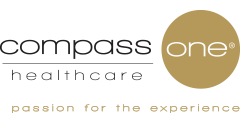
An interview with Andy Maus, Compass One Healthcare, Senior Vice President, HR
How does human capital management relate to a healthcare organization’s overall strategy?
There is nothing more important for hospitals and healthcare organizations than their people. Over the past few years, we’ve been challenged with a staffing crunch, which has led to significant shortages and increasing salary expenditures. With that in mind, organizations need to put human capital at the forefront of their strategy. By taking care of the people who take care of our patients, we can ensure access to care and deliver better results for all stakeholders. This is equally true for caregivers and support staff in a hospital.
Do we do enough to retain our associates in healthcare?
The simple answer is—we can do more. The impact of turnover among healthcare food and support services staff is essential because non-clinical staff members are essential to providing safe and positive patient experiences. Retention deepens and strengthens organizational culture, making it a key driver of success. When it comes to healthcare, losing staff isn’t just detrimental to culture and quality of care — it’s also expensive. We need to invest in programs that keep our associates in place, allowing us to attain operational sustainability.
What strategies can healthcare organizations implement to boost retention efforts?
Retention starts with strategic recruitment that offers a competitive wage for the local market, establishes associate referral programs, and leverages artificial intelligence and cultural assessments. Once a baseline is established, organizations can create standardized onboarding processes. The first 90 days of employment are critical for any healthcare associate, especially for frontline staff. Onboarding should focus on organizational, technical, and social aspects, setting new employees up for success while giving them the tools they will need to perform in their new role. A good onboarding program will integrate associates into the organizational culture and make them feel valued from the start.
Does training and development impact recruitment and retention?
Training is vital to every organization, and it doesn’t stop at the completion of onboarding. We need to invest in our people through training and development and prioritize create career pathways. Ongoing development for healthcare food and support services can positively influence frontline associates’ work experience, but training and development must be implemented strategically. When support services employees get the encouragement to participate in regular development opportunities at work, they’re more likely to stay longer and be more satisfied with their jobs.
How do we make retention an ongoing initiative?
Boosting engagement leads to greater job satisfaction. Beyond measuring retention rates, regularly measuring engagement, and proactively taking steps to boost associate engagement will benefit your organization’s associate retention efforts. Every 18 months, Compass One facilitates an anonymous employee engagement survey. The results provide a roadmap and insights to forward-thinking engagement initiatives that boost retention.
How important is prioritizing diversity in the recruiting process?
With a diverse group of backgrounds, faiths, skills, ethnicities, and orientations, healthcare organizations are stronger and better able to serve their communities. According to a McKinsey report, companies with a more diverse workforce are 33% more likely to outperform their competitors financially. Within a recruitment strategy, it is important to broaden the candidate search, designate dedicated DE&I recruiting champions, continually train and educate talent acquisition staff, and leverage AI to curb bias.
How can you recruit smarter to improve employee retention in healthcare?
Through thoughtful design of onboarding best practices that boost the likelihood that employees stay. By understanding how recognition impacts engagement, loyalty, and retention. The first 90 days are critical. We have an opportunity to reach those associates, listen, and learn.
What’s next for associate engagement and retention?
We are currently piloting our Employee Experience initiative, assigning employee experience ambassadors at key accounts who focus on elevating the experience for new hires. Our “North Star” is to create a consistent, best in class employee experience that significantly improves retention and loyalty. While the objective is to enhance engagement that impact all stages within the employee life-cycle, a key pillar of this initiative is targeted at new hire onboarding and engagement. We believe this is key to building long-lasting partnerships with employees and creating a workplace that supports their happiness, satisfaction, and performance. A good onboarding process sets the tone for an enriching employee experience, ensuring new hires feel welcome and well-equipped to succeed in their role.
What is at the top of mind for you and your team?
Optimizing strategic training in healthcare food and support services impact healthcare organizations’ ability to deliver safe, high-quality, patient-centered care. Making this process seamless for everyone involved–and meaningful for our associates–is critical. Compass One Healthcare is committed to ensuring that we have engaged, trained and productive team members that feel supported.
Fast Facts:
-
Our vast Compass Group labor pool boasts over 5 million talented individuals nationwide.
-
FNS Sector Morrison Healthcare achieved an impressive internal promotion rate of 41%.
-
In FY24, Morrison proudly welcomed 9,200 new associates to our team.
-
On average, candidates experience a streamlined process, receiving contact from the hiring manager, conducting interviews, and receiving job offers within an efficient 8.5 day period.


